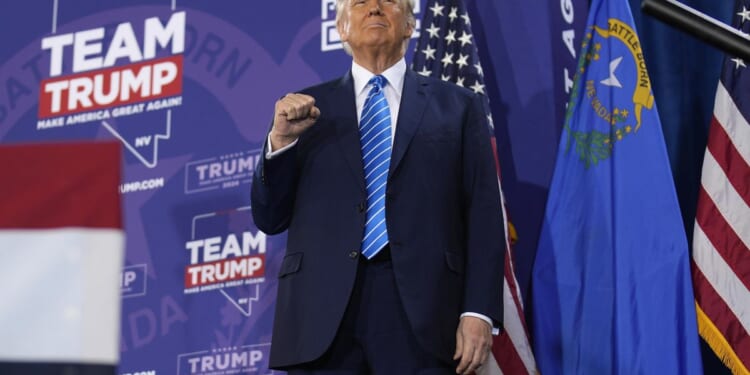
The Illinois State Board of Elections on Tuesday voted to keep former President Donald Trump on the primary ballot, reasoning the board doesn’t have jurisdiction over constitutional matters.
The vote was unanimous from the four Democrats and four Republicans on the board. It would have taken a majority to remove Mr. Trump from the ballot.
It was the latest decision in Mr. Trump’s favor amid efforts across the country to knock him off the ballot for violating the Constitution’s “insurrection” clause.
The anti-Trump ballot moves are underway in more than a dozen states.
In Illinois, five voters filed a challenge arguing that Mr. Trump was ineligible for the state’s March 19 Republican primary ballot because of the ex-president’s link to the riot at the U.S. Capitol in 2021.
The Supreme Court is slated to hear arguments on Feb. 8 to decide the legitimacy of Calorado disqualifying Mr. Trump from the ballot because he is an insurrectionist. The decision will impact the efforts nationwide to remove Mr. Trump from the election.
The efforts are based on this clause in the Constitution:
“No person shall be a Senator or Representative in Congress, or elector of President and Vice-President, or hold any office, civil or military, under the United States, or under any State, who, having previously taken an oath, as a member of Congress, or as an officer of the United States, or as a member of any State legislature, or as an executive or judicial officer of any State, to support the Constitution of the United States, shall have engaged in insurrection or rebellion against the same, or given aid or comfort to the enemies thereof.”
The provision was written into the 14th Amendment in 1868 with the Civil War in mind, but the former president’s opponents say it should apply to his attempts to stop certification of President Biden’s victory.
Mr. Trump’s legal team asked the high court to take the case and told the justices in a filing this month that it should reverse Colorado’s “dubious” decision, which could “unleash chaos and bedlam” if other state courts follow suit.
A ruling could come soon after oral arguments, given the time-sensitive nature of the dispute due to the primary calendar.
A quick decision is not unprecedented. The high court was able to decide Bush v. Gore in 2000 in just days, issuing its opinion the day after oral arguments were held.
The Colorado Supreme Court‘s decision was the first major ruling on the question to go against Mr. Trump. Maine’s Democratic secretary of state, Shenna Bellows, also tried to remove the former president from ballots, using the same legal justification. The move was put on hold by a state court, and Maine’s top court said it would wait for the Supreme Court’s decision in the Colorado case before hearing Ms. Bellows’ appeal.
The Colorado justices for the majority acknowledged they were breaking new legal ground. But they said their reading of the U.S. Constitution indicated Mr. Trump was part of an insurrection that saw a pro-Trump mob delay counting of the Electoral College votes on Jan. 6, 2021.
Though Mr. Trump is facing several indictments, he has not been charged or convicted of leading an insurrection during the Capitol protest.
• This article includes wire service reports.












